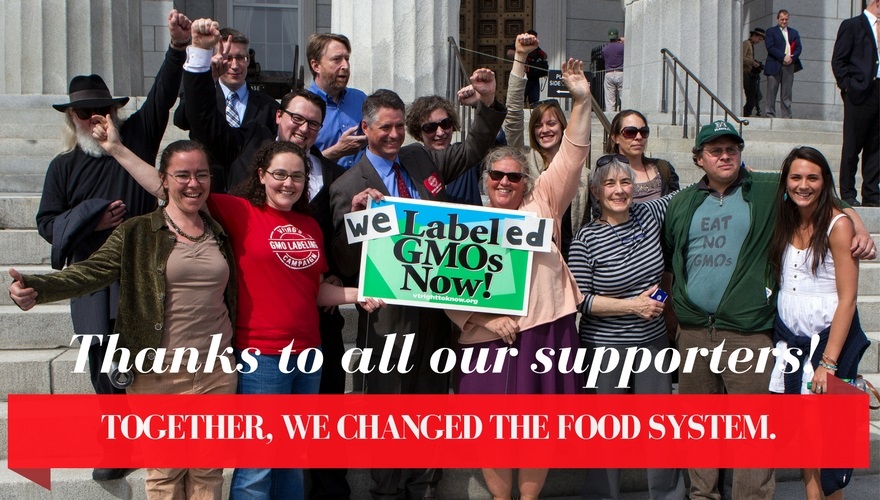On Friday, July 29th President Obama signed the Stabenow-Roberts labeling bill, otherwise known as the “DARK Act,” which was passed in an effort to eliminate Vermont’s GMO labeling law.
In response, the Vermont Attorney General announced on Wednesday, August 3rd that our law will no longer be enforced. Manufacturers have already begun labeling their products to comply with Vermont’s law, and a number of companies have announced that they will continue to label their products until a national standard is developed.
The DARK Act is deeply flawed, and was opposed by consumer and food advocates from across the country. The law not only eliminates Vermont’s first-in-the-nation GMO labeling law, it also elimiantes Alaska’s GMO salmon labeling law, and Vermont and Virginia’s GMO seed labeling laws. It gives the Department of Agriculture two years to develop standards for labeling genetically engineered foods, including a “QR” code that could only be read using a smartphone with internet access and the correct application. These digital codes are discriminatory, and would be inaccessible to approximately half of rural and low income Americans without smartphones or cell phone service.[i] This is clearly an inadequate means of disclosure considering less than 20% of Americans have ever used them to scan one of these digital codes.[ii]
Further, even the FDA has weighed in with its concerns about this legislation, saying that the narrow definition of bioengineered foods “will likely mean that many foods from GE sources will not be subject to this bill.”[iii] Beyond all of this, there are no penalties for lack of compliance and no authority to recall products that are not properly labeled.
Despite this heartbreaking turn of events, it is important for us to reflect on the amazing things that we accomplished together. Genetically engineered foods are now labeled in grocery stores across the country. National food manufacturers like Campbell’s and Mars have announced that they will continue to label their products, and others are expected to follow suit. Just as important, we helped create a law that has stood up in court, bolstering consumers’ right to know about what is in a wide range of products on our store shelves.
One of the biggest things to take away from this historic campaign is that Vermont is a place where democracy actually works, and we have the ability to have a huge impact on important national issues. In the coming months we will fight to make the new national labeling standard as strong as possible, and hold companies accountable for keeping labels on their genetically engineered products. We will also continue fighting for a safe and transparent food system that puts consumers and our environment ahead of corporate interests.

We want to personally thank all of you who helped us achieve victories many thought were impossible. Your work changed our food system for the better, and millions of people now know what is in their food thanks to what we did here in Vermont.
Stay tuned in the coming weeks and months for more information about how we can continue to fight for a safe and transparent food system.
[i] U.S. Smartphone Use in 2015: Chapter One: A Portrait of Smartphone Ownership. Aaron Smith. Pew Research Center. April 1, 2015
[ii] Findings From A National Survey Of Likely 2016 General Election Voters November 2015. Mark Mellman. The Mellman Group, USA. Dec, 2, 2015.
[iii] FDA/HHS Technical Assistance on Senate Agriculture Committee draft legislation to establish a national disclosure standard for bioengineered foods (EDW16734), June 27, 2016. P 2

